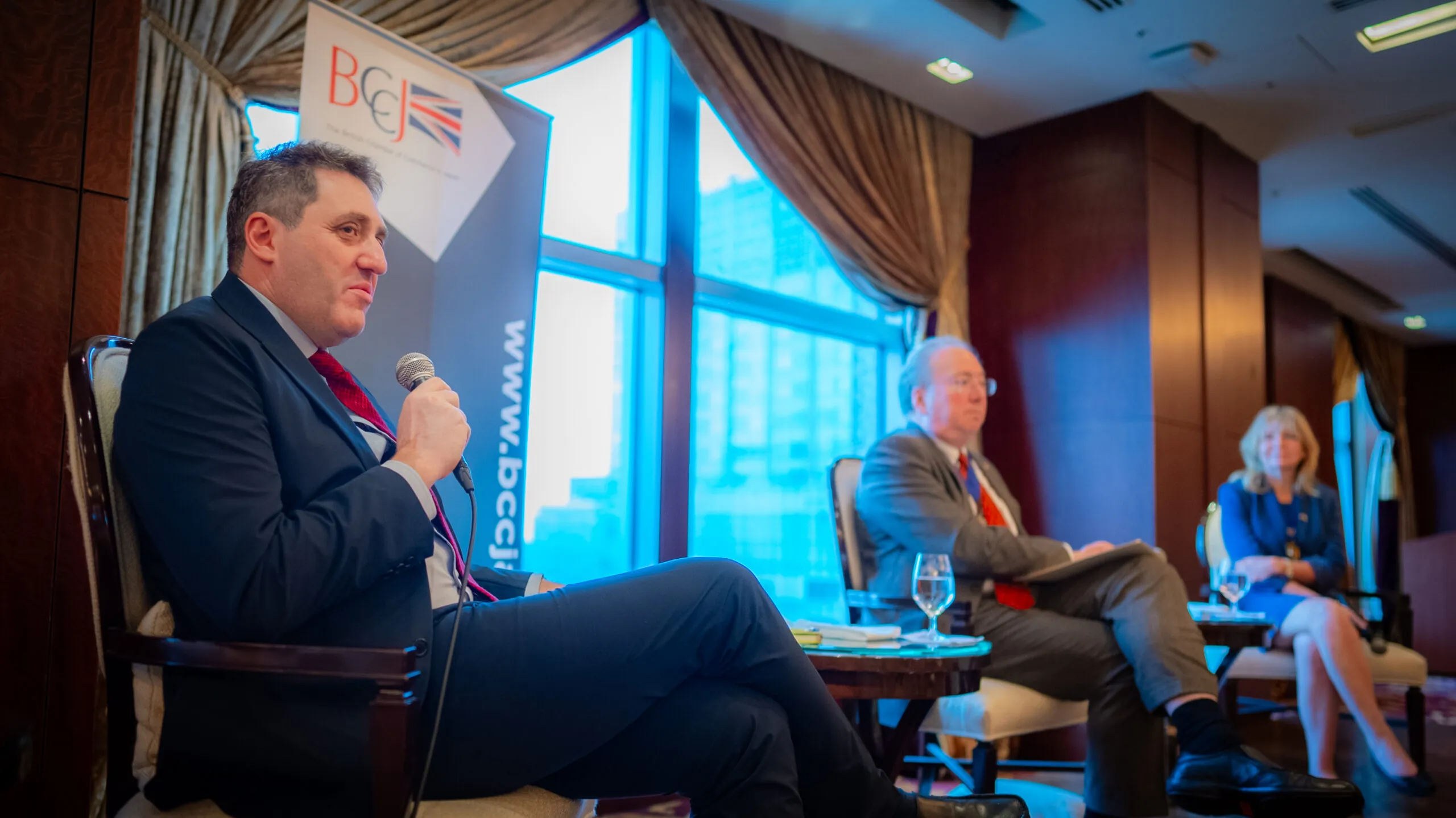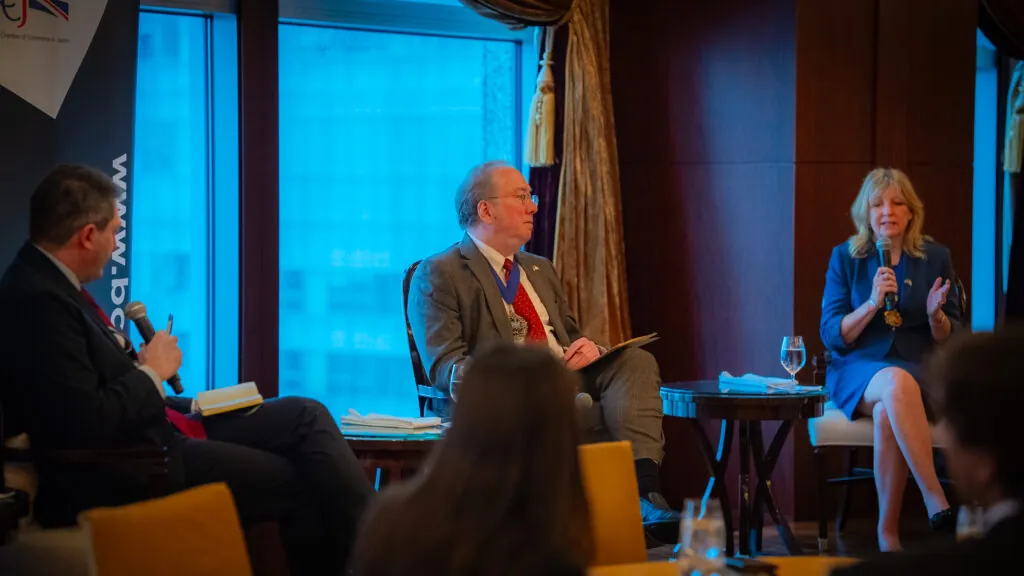Capital connections: building stronger UK–Japan ties
In 2017, a Memorandum of Understanding (MOU) was signed between the City of London and the Tokyo Metropolitan Government, thereby further enhancing financial cooperation between the two global capitals. The collaboration was a pivotal step to position Tokyo as a “Global Financial City.” Ties between the two cities continue to be strengthened, particularly in areas of mutual interest including financial events, educational programmes in finance and initiatives focusing on green finance.
On May 31, the British Chamber of Commerce in Japan hosted the City of London’s Lord Mayor, Alderman Professor Michael Mainelli, and Sheriff, Dame Susan Langley, in a wide-ranging discussion on the City of London’s latest initiatives, the evolving role of London and Tokyo in global trade and how the partnership has developed since the MOU’s signing some six and a half years ago.
The City of London’s 695th Lord Mayor, Mainelli said his focus during his one-year term is on his theme of Connect To Prosper, an initiative aimed at harnessing the City’s knowledge ecosystem to help solve global challenges.
Stating that “Japan and the UK are extremely important partners,” he pointed to Japan being the first nation to sign a free-trade agreement (FTA) with the UK post-Brexit (in 2020), as well as the 2023 agreement of the Hiroshima Accord.
The 2017 MOU has “helped the flow of business between Japan and the UK, particularly in asset management and fintech, and has enhanced the relationship between our two financial centres,” he said.
“What it has already done is put in place regular dialogues: an annual Tokyo–London financial seminar; the Tokyo–London green finance seminar; and a regular working group between the Tokyo Metropolitan Government, the UK government and the City of London.
“We have had frequent visits from the Tokyo Governor and have been coming back here every single year for eight years [with virtual visits during the pandemic].
“We were honoured that Prime Minister Kishida chose not just the UK, but the City of London and more specifically our Guildhall headquarters to launch his new economic policy in 2022. And during this trip, we’ve been meeting with key stakeholders to discuss areas for collaboration, namely asset management, fintech and green and sustainable finance,” he continued.

Connect To Prosper
Boasting over 40 learned societies, 70 higher education institutions and 130 research institutes, the City of London’s Square Mile is seen as the “world’s coffeehouse, where people bring their dreams to get them realised,” according to the City of London.
The Lord Mayor’s Connect To Prosper initiative aims to bring together thought leaders from areas such as the arts and media, engineering, finance, insurance, investment management, law, shipping and other disciplines to address global issues.
Part of Connect To Prosper is the Ethical AI Initiative aimed at promoting the ethical deployment of artificial intelligence, including the Walbrook AI Accord that has been signed by 30 countries.
Efforts are also underway in “space protection” – “a simple concept that you ought to be using a surety bond if you put anything up in space,” supporting the work of companies removing space debris, such as Japan’s Astroscale; “smart economies,” such as enhancing open banking; “construction science” to help convert B-grade offices into life sciences laboratories; and a worldwide mental health research project, Galenos.
Asked his view of Japan, the Lord Mayor said he had seen a lot of changes since his first visit in 1982, describing himself as “bullish on Japan economically.”
Comparing Japan today to Japan at the end of the bubble economy in the early 1990s, he said Asia’s second-largest economy has enjoyed enhanced educational levels, improved longevity and even greater happiness of citizens. He also praised Abenomics for encouraging greater investment abroad, a move that has enabled extra income growth on Japanese assets.
“There is a lot of fantastic stuff to invest in here: fusion energy, hydrogen, healthcare, robotics, anything to do with the elderly, and pharmaceuticals,” he said.
Discussing “global Britain” in the wake of Brexit, the Sheriff said the City of London had a “huge role” in attracting global investment to the UK.
“We have a brilliant business environment, strong rule of law, good regulation, a huge ecosystem of services and firms around that; we’re multicultural, very tolerant. Also there’s the soft [power] benefits of the UK, which is our culture,” she said.
“Why do people come to Britain and the City? It’s just not the economy, it’s the soft power we have, and the City is the place where people like to live and work.”
The Lord Mayor noted that the City of London’s workforce has grown to 615,000 people from 525,000 in 2016, with its share of global assets under management also rising to 13% from 11% previously.
Asked about the Japanese Emperor and Empress’ planned state visit to the UK at the end of June, the Lord Mayor said such visits often proved significant in increasing bilateral trade.
“State visits are often more important than free-trade agreements – every time we’ve had state visits, we’ve seen trade with that nation go up markedly,” he said. He pointed to the “deadline” effect of companies seeking to have investments announced during a state visit, together with the increased familiarity following such visits.
“There’s nothing like the soft power of Buckingham Palace combined with a Guildhall economic banquet,” he said.

